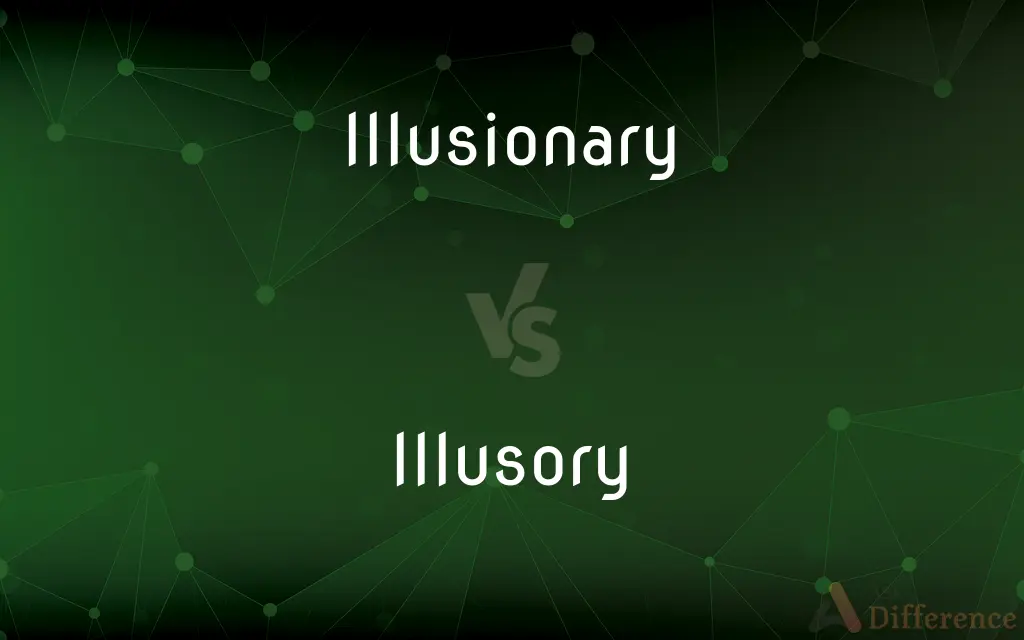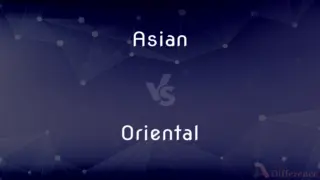Illusionary vs. Illusory — What's the Difference?
By Tayyaba Rehman & Urooj Arif — Updated on April 24, 2024
Illusionary refers to something based on or causing illusions; illusory means something that deceitfully appears real.

Difference Between Illusionary and Illusory
Table of Contents
ADVERTISEMENT
Key Differences
Illusionary concepts often involve elements that trick the senses, creating perceptions of reality that are not actually present. Whereas, illusory pertains specifically to things that are deceptive or misleading in nature, suggesting a false impression of reality.
In literature, an illusionary setting might be used to enhance the mystical elements of a story, providing a backdrop that seems magical or surreal. On the other hand, an illusory setting might be employed to mislead characters (or the reader), playing into the plot's twists and turns.
Illusionary effects in art are techniques used to alter the viewer's perception through visual design, making flat images appear three-dimensional. In contrast, illusory effects are used to manipulate the viewer’s understanding of the art, often making them question what is real.
Technologies that create illusionary experiences, such as virtual reality, are designed to completely immerse users in a fabricated environment. Illusory technologies, however, might include things like augmented reality, which overlays deceptive or misleading elements onto the real world.
Illusionary can also describe a sense of false hope or dreams that are not grounded in reality. Illusory, by comparison, might describe promises or expectations that are intentionally set to deceive or are unattainable.
ADVERTISEMENT
Comparison Chart
Definition
Pertaining to or causing illusions
Based on illusion; deceptive
Usage in context
Often used in artistic settings
Common in discussions of deception
Connotation
Neutral, imaginative
Negative, misleading
Related to
Perception, senses
False impression, deceit
Examples
Virtual reality, magical realism
Scams, mirages
Compare with Definitions
Illusionary
Describing something not actually present but perceived.
The illusionary landscape in the video game was incredibly detailed.
Illusory
Describing something falsely perceived as real.
The wealth he promised her was illusory.
Illusionary
Associated with imaginative creation.
The artist's illusionary designs challenge our perception of space.
Illusory
Pertaining to deceptive appearances.
The oasis in the desert was an illusory haven.
Illusionary
Pertaining to dreams or fantasy.
His vision of an ideal society was somewhat illusionary.
Illusory
Connected to unrealistic expectations.
The notion of getting rich quickly is often illusory.
Illusionary
Relating to illusions in performance.
The magician's illusionary skills amazed the audience.
Illusory
Involving a misleading impression.
His confidence was merely illusory.
Illusionary
Referring to phenomena that distort reality.
The illusionary effects in the movie made the scenes breathtaking.
Illusory
Relating to trickery or fraud.
They realized too late that the investment was illusory.
Illusionary
An erroneous perception of reality
Mirrors gave the illusion of spaciousness.
Illusory
Produced by, based on, or having the nature of an illusion; deceptive
An illusory belief that their finances would improve.
Illusionary
An erroneous concept or belief
The notion that money can buy happiness is an illusion.
Illusory
Resulting from an illusion; deceptive, imaginary, unreal.
Illusionary
The condition of being deceived by a false perception or belief
Spent months flailing about in illusion.
Illusory
Deceiving, or tending of deceive; fallacious; illusive; as, illusory promises or hopes.
Illusionary
Something that is erroneously perceived or construed
The animal in the shadows turned out to be an illusion.
Illusory
Based on or having the nature of an illusion;
Illusive hopes of of finding a better job
Secret activities offer presidents the alluring but often illusory promise that they can achieve foreign policy goals without the bothersome debate and open decision that are staples of democracy
Illusionary
A fine transparent net fabric, used for dresses or trimmings.
Illusionary
Illusory; pertaining to an illusion, or of the nature of an illusion.
Illusionary
Marked by or producing illusion; as, illusionary stage effects.
Illusionary
Marked by or producing illusion;
Illusionary stage effects
Common Curiosities
Can something be both illusionary and illusory?
Yes, something can be both illusionary and illusory if it both creates an illusion and deceives.
How is illusory used in legal contexts?
In legal contexts, illusory often describes agreements or terms that appear valid but lack substance or enforceability.
What does illusory mean?
Illusory describes something that is deceptive or gives a false impression of reality.
Are illusionary experiences real?
Illusionary experiences are not real; they are perceptions created by manipulating sensory input.
What does illusionary mean?
Illusionary refers to something that is based on or related to illusions.
What is the difference between illusionary and imaginary?
Illusionary relates to creating sensory illusions, whereas imaginary is purely from imagination without sensory deception.
How is illusionary used in psychology?
In psychology, illusionary may refer to perceptions or beliefs not based on reality.
What is an illusionary effect in art?
It's an artistic technique that alters perception to make two-dimensional artwork appear three-dimensional.
Is "illusory" a negative term?
Illusory generally has a negative connotation as it relates to deception.
What is an example of an illusory promise?
An illusory promise is a contract term that fails to bind the promisor, offering no real commitment.
Share Your Discovery

Previous Comparison
Asian vs. Oriental
Next Comparison
Eragrostis vs. TeffAuthor Spotlight
Written by
Tayyaba RehmanTayyaba Rehman is a distinguished writer, currently serving as a primary contributor to askdifference.com. As a researcher in semantics and etymology, Tayyaba's passion for the complexity of languages and their distinctions has found a perfect home on the platform. Tayyaba delves into the intricacies of language, distinguishing between commonly confused words and phrases, thereby providing clarity for readers worldwide.
Co-written by
Urooj ArifUrooj is a skilled content writer at Ask Difference, known for her exceptional ability to simplify complex topics into engaging and informative content. With a passion for research and a flair for clear, concise writing, she consistently delivers articles that resonate with our diverse audience.














































